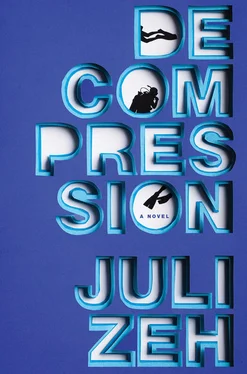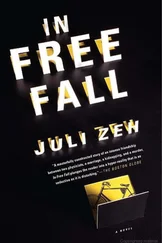
The dive site near Mala was a lonely spot, not easy to reach. Level places for entering the water were nonexistent. You had to clamber down barefoot over slippery rocks with the heavy scuba tank on your back and the fins and mask under your arm until you were close enough to the bay to jump. I left the van on the edge of the gravel road; we stood in black sand and changed into our diving gear. Slowly, step by step, reaching for each other’s hand to get over the hard parts, Jola and Theo climbed down. The sea was rougher than I’d hoped it would be. I decided to hurry up so they wouldn’t have too much time to stare down into the waves. I quickly demonstrated how they should jump into the water, with one hand on their weight belt and the other in front of their face. Theo stroked Jola’s shoulder before launching himself. He surfaced near me and made the “okay” sign.
Jola was still standing on the rocks; her body language was the picture of a struggle. Apparently she was giving her legs orders they had no wish to carry out. At last she leaped forward, a little too forcefully, and dropped right on top of me. I softened her impact, held on to her, fully inflated her buoyancy compensator, made sure her head remained above water. She’d temporarily lost her diving regulator, and she was coughing. I wanted to get under as quickly as possible, because it was dangerous to stay so close to the rocks. Under the water, calmness would reign. I gave the sign to submerge, and down we went.
Immediately, a great quiet surrounded us. The special silence of the sea. Movements slowed down and communication became a dance, a choreography of signs and gestures. Underwater, relationships were simple, requirements unequivocal, and responses radical. If you dove down ten meters, you simultaneously traveled back ten million years in the history of evolution — or back to the beginning of your own biography. You were in the water where life began, floating and mute. Without speech, no concepts. Without concepts, no justifications. Without justifications, no war. Without war, no fear. Not even the fish were afraid of us. Some curious ones came close and accompanied us for a while. If we kept still, they’d cast intense glances into our diving goggles. In exotic worlds, the tourist doubled as an attraction. I was fascinated by the peace that prevailed underwater, where hunter and prey lived together, courteously avoiding one another — a peace interrupted only by the brief cravings of hunger, which was no treachery but rather a generally accepted process of selection.
Despite the swells, subaqueous visibility was amazingly good. One of the most beautiful dive sites on Lanzarote stretched out before our eyes. The island’s bizarre volcanic landscape continued underwater, forming a stone city with towers, columns, archways, and battlements. When the sun broke through the clouds above, we found ourselves floating inside a dome of rising air bubbles and light. I felt happiness like a fist in my stomach. Theo lay in the water next to me and looked up too.
Something wasn’t right with Jola. In order to get around a lava stream that reached well out into the sea, I’d led my two clients close to the rim of the ledge, where the seafloor dropped straight down. Two groupers, as long as grown men, lay on the rim as though enjoying the view. Jola had swum out over the ledge, emitting air bubbles far too frequently. Like a bird unsure of whether it could really fly, she was staring into the deep. Fear of heights presented a serious problem underwater. With a couple of fin strokes, I moved beside her and grasped her arm. She flinched away. For a second I thought she was going to strike at me.
Over the years, I’d developed an automatic reaction: the more frantic a diver was, the calmer I became. I slowed my movements down to the point where I hardly knew whether I was actually doing something or merely present. Behind her diving goggles, Jola stared at me with wide-open eyes. Her chest rose and fell much too fast; she was already hyperventilating. I squeezed her forearm several times, trying to get her to focus her attention. When her eyelids stopped fluttering and she began to concentrate on me, I nodded approval and signaled, Good . I moved one hand slowly away from my mouth and closed my eyes: Exhale. Wait . I opened my eyes: Now you . She exhaled but immediately filled her lungs again, shot panicked glances left and right, and even looked upward, considering whether she should simply go back up to the surface. I tightened my grip on her arm and shook my head emphatically: No. Look at me. Exhale. Wait. Inhale slowly . Now she was following my instructions, but her eyes were still too wide. We found a common rhythm. Exhale. Wait. Inhale slowly . She calmed down. I let go of her arm, took her hand, and shook it: Congratulations, well done . She sheepishly returned my “okay” sign. When I tried to withdraw my hand, she clung to me hard: Don’t leave me! Peering through her mask, I could see she was crying. The sensation of suffocating is among the worst a person can experience. At that moment, Jola needed only one thing in the world: me.
The reading on her pressure gauge was under 100 bar; she’d breathed her tank half empty in two minutes. I was determined to proceed with the dive, and it was essential to do so in an orderly fashion. One of the most important principles beginners must grasp is that diving problems have to be solved underwater. Emergency surfacing isn’t an option. I signaled to her that we were going to share my air supply. We’d practiced this — two divers breathing from one tank — in shallow water. Now I showed her my octopus, my spare demand valve, and made sure she understood me. Inhale. Take your own regulator out of your mouth and switch to the octopus. Breathe again . She did everything right.
We took each other by the hand. From that point on, we were joined together like Siamese twins, connected to the same air supply by two different hoses. We swam away slowly. I could feel her trembling; hyperventilation leads to poor blood circulation. She probably felt she was on the verge of freezing. As well as our equipment would allow, I put an arm around her waist and drew her close to me. Naturally, my body heat couldn’t warm her underwater, but freezing, like most things in life, is primarily a matter of attitude.
Theo had observed the scene with interest. Instead of looking out for rays, he’d kept his eyes on us, as though he’d discovered the two most fascinating marine animals in the Atlantic Ocean. I guided Jola close to the coastal rocks and showed her some bright yellow snails and the shrimp that were hiding in crevices between stones and groping toward us with their long feelers. I shone my pocket flashlight on a starfish to bring out its red color. Jola turned her head and smiled at me, and then something happened. I suddenly realized that I liked holding her in my arms. I didn’t want to let her go. I wanted to stay down there with her, I wanted us to observe the creatures of the sea together until the last trumpet. Jola felt how hard I recoiled and pressed herself closer to me. I gently pushed her away and signaled that she should switch back to her own air supply before we started to ascend. The exchange was flawless. We detached ourselves from each other. It felt like an amputation.

When I knocked on the Casa Raya’s door that evening, intending to pick up Theo and Jola and drive them somewhere for dinner, Jola didn’t want to come. She declared that she had to study for her nitrox certification. Then she looked away and drummed her fingers on the tabletop. Nothing to be done. After the unsuccessful dive a few hours earlier, she’d stood off to one side, wrapped in a towel, with the volcanic panorama in the background. I could still see her like that: shivering piteously and looking small, as if the coldness of the water had shrunk her, with hunched shoulders and blue lips and strands of wet hair stuck to her cheeks and neck. Theo had carried her equipment to the van. Now he glanced over at me with a new, thoughtful look on his face.
Читать дальше













